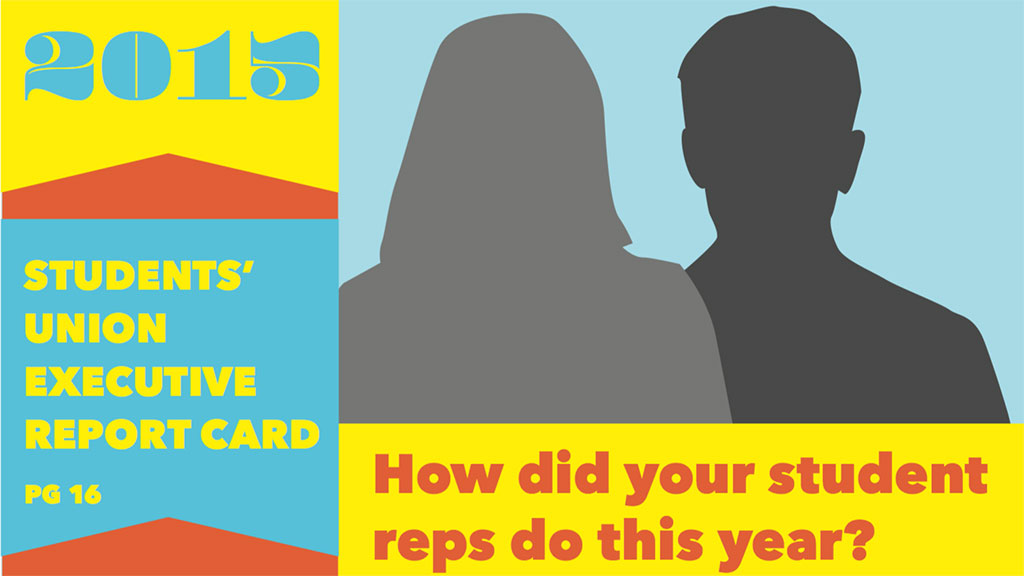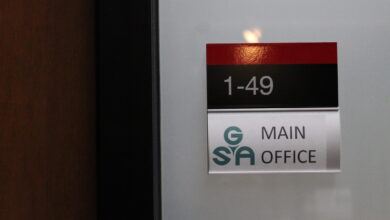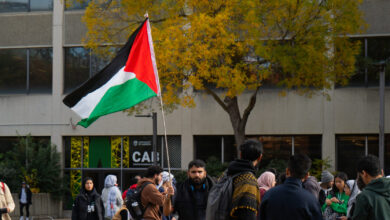Students’ Union Executive Report Card 2015
 Jessica Hong
Jessica HongPresident — William Lau: C

There’s no denying that William Lau seems like a nice guy.
He’s incredibly encouraging of all students, willing to listen to students whether it’s an in-person conversation or responding to a Facebook confession online. His work this year has largely centred around creating a respectful and compassionate approach to his work.
However, relative to what students should expect from their SU, Lau’s work this year has been fairly lacklustre. It’s not that Lau has particularly failed in any way, but moreso that his ambitions as President have been fairly limited and he’s done little outside of what’s expected of every President.
Lau ran on a campaign platform of vague promises to engage students, prioritize the student voice and maximize student representation. None of these were particularly specific, and a lack of promises has led to a lack of accountability in office. Lau hasn’t failed on many promises this year, because he didn’t promise much in the first place. As a result, he hasn’t spent his time in office making very many truly tangible and real improvements to his representatives.
That’s not to say Lau hasn’t done anything at all, of course. The Peer Support Office is expanding to satellite campuses and the widened conversation about student mental health has been commendable. Sure, bringing pianos on campus may be a silly, ineffectual way to help mental health at the U of A, but the fact that Lau made this issue a priority of his term is beneficial for a lot of students.
On top of that, Lau has reminded the university’s Board of Governors about the importance of taking accessibility into account when discussing raising tuition, even for CPI increases. But the simple fact is that good intentions don’t necessarily make a good leader. Real action does, little of which has been seen from Lau this year.
Possibly the biggest success of Lau’s campaign has been his efforts to get more students involved in extra-curricular activities on campus. For one thing, Lau has helped lead the development of a handbook to guide groups on campus that seek student participation. For new students, the SU plans to send more information about everything you can do outside of class at the U of A when they receive their acceptance letters, which could lead to a more engaged campus one day, and even inspire a leader to take the role of SU President years from now. This mean that one day, a future SU President may take office thanks to Lau’s initial work to encourage that student to get involved at the U of A.
Hopefully, that future President will achieve more in their year than Lau has done in his.
Vice-President (Academic) — Kathryn Orydzuk: B+

Despite the VP (Academic) portfolio’s dry and relatively unengaging nature compared to some other SU executives, Kathryn Orydzuk has made some of the biggest strides in the SU this year to make real improvements to student life.
With university tuition continuing to rise, Orydzuk has found ways to support making university education more affordable for students. The Be Book Smart campaign has informed many new students this year how to save money on academic materials, while the SU’s partnership with the Teaching and Learning Centre has resulted in a $1,000 award for professors that adds incentive for finding innovative ways to save money on materials for their class.
Textbooks will also be easier to come by after the U of A’s libraries are purchasing textbooks that will be free for students to borrow. Originally, Orydzuk had planned to create a textbook library in SUB, but upon learning of this initiative, the SU instead put money towards helping develop this cause. Making textbooks more affordable is responding to a common complaint many students have.
Orydzuk’s other main campaign point was implementing mandatory rubrics for projects worth 20 per cent or more of a course’s overall grade. While she wasn’t able to accomplish that this year, she got the ball rolling on this issue that will inevitably be picked up and completed by a future VP(Academic) down the line.
She’s also advocated for students’ best interests academically, helping to introduce mid-term professor evaluations that will allow professors to receive feedback that could alter the way they teach a course. Her representation of all students has also led her to be a staunch critic of the newly developing leadership college, questioning whether it will be connected to already existing organizations and if it will benefit all students rather than a small minority.
The foundation Orydzuk has set to make students academic lives easier in the next few years is undeniable and deserving of a high grade.
Vice-President (External) — Navneet Khinda: A-

It’s not much of a stretch to say that Navneet Khinda is one of the most visible Vice-Presidents the Students’ Union has had in years.
For the Vice-President External’s portfolio, that kind of visibility has been a crucial part of Khinda’s term. The 2014–15 school year has been a tumultuous one for the provincial government. Two Ministers of Education, the debate surrounding market modifiers and upheaval in the provincial Conservatives during the past year has made advocacy efforts more difficult than usual, but Khinda has very publicly found ways to ensure student voices are represented.
Unfortunately, it’s unavoidable that Khinda’s time in office will be remembered for the tuition hikes several departments underwent last fall due to market modifier increases. But it’s largely thanks to Khinda’s discussion about these increases in the media, her rally on the provincial legislature and her publicizing the opening of this topic in the first place, that has kept students informed. Relationships with the provincial government are rockier for the SU now, but Khinda sacrificed this for the sake of ensuring student interests were heard and defended.
Besides that, Khinda has made strides to try and engage campus more about politics on every level. The Get Out the Vote campaign for next year’s provincial election will inform U of A students about election issues affecting them, why they should vote and how they can register. Khinda is also in talks with Elections Canada to bring polling stations to campus for the next federal election where every student will be able to vote regardless of their constituency.
The results of some other aspects of her position that Khinda campaigned on still remain to be seen. The new federal and provincial government budgets will indicate whether a worthy replacement for STEP (the old student summer employment program) will be put in place, and whether more support for student aid through upfront grants will be implemented.
Regardless of how those budgets turn out, some will inevitably hold the market modifier increases against Khinda as a negative, or even her involvement in Project Feminist U, which (while unrelated to her position) has been a positive cause for the SU to get behind. But, she has undeniably taken an impressive stance standing up for students, even if the government’s decisions didn’t always benefit students.
Vice-President (Student Life) — Nicholas Diaz: C+

So far, Diaz has kept relatively quiet, focusing more on targeting systemic issues through advocacy rather than throwing flashy events like his predecessors.
One of Diaz’ campaign promises included “diversifying campus events.” This year, though, campus events have remained, well, un-diverse. Instead of planning big, new shindigs, Diaz has focused his efforts on providing sponsorship for externally planned events such as the Long Night Against Procrastination, International Week and the Hide and Seek Club’s upcoming attempt to break the world record. Considering the cost and lack of space for Break the Record, Diaz made a responsible choice in not backing the dodgeball attempt. However, it does leave quite a bit to be desired in the realms of events that bring campus together like dodgeball, ways that the hide-and-seek record attempt doesn’t promise. And although he didn’t campaign on it, he admittedly didn’t start deliberating the plausibility of hosting Break the Record until November (in previous years, planning starts in the summer). While Diaz says Week of Welcome attendance was higher than usual this year and that the SU’s movie and comedy nights are getting more popular, much of this is attributable to the SU’s Events & Venues staff.
Residence Services has been Diaz’s biggest effort this year, seeing him help rewrite student housing policy and support the Residence Halls Association as they change their constitution to operate similarly to the council of faculty associations. As well, he created a residence complaint form, so residents can direct issues to the Students Union.
Along with VP (Academic) Kathryn Orydzuk, Diaz founded a Student Group Services review committee. Over the next two months, Diaz anticipates three main outcomes of the committee: group constitution reviews happening every three years instead of every year, registration statuses of groups will be public, and will have created a new operating policy to streamline the requirements and procedures afforded by student groups.
Diaz has been a solid advocate for students and has created a sustainable foundation for his successors to build upon. However, his advocacy work, at this point, seems to only benefit niche groups, and is absent of any unique initiative that would make his term memorable.
Vice-President (Operations and Finance) — Cory Hodgson: B+

After spending two years as a science councillor, Hodgson’s deep knowledge of the university and SU has allowed him to make effective structural changes to the organization.
Hodgson began his year by tackling advocacy work aimed at bettering the financial situations of students: negotiating distribution standards for the university’s new undertaking of The Access Fund (a non-repayable financial assistance service) and proposing alternative fee structure systems for Mandatory Non-Instructional Fees and Common Student Space, Sustainability and Services fees — the results of which the SU is still waiting to hear back on.
But he’s also taken unusual, yet useful, initiative with his portfolio by uprooting what he sees as structural issues with the SU — and not just financially. While he’s continuing his work on the Dedicated Fee Unit (DFU) Taskforce which he first sat on as a councillor, he’s also currently piloting regulatory frameworks to streamline Faculty Associations’ fee-reporting mechanisms. In a move uncharacteristic to his position, Hodgson struck the Governance Structure Review Taskforce task force in December, which aims to identify and report on council and the SU’s structural flaws.
Hodgson noted that since switching to table service and receiving an aesthetic “facelift” over the summer, Dewey’s revenue has increased dramatically. He also noted RATT’s new menu and weekly specials and Daily Grind’s “phenomenal” client loyalty as successes for the SU’s businesses. However, Dewey’s and RATT’s customer service is still lacking despite these changes, and he credits these listed gains mainly to the businesses’ managers rather than his own initiative.
He does have plans to improve upon SU businesses through the Student Market Research Team (SMRT), which was started by former VP (OpsFi) Josh Le last year. He has re-vamped the committee from being a discussion-based group to play a more serviceable role to Dewey’s, RATT and SUBmart’s managers. The team is currently working on business-based questions to put into the SU’s annual survey.
Hodgson is a self-described policy nerd and it shows. He’s made effective use of his time in his position by excavating under-the-surface issues in the organization.
Board of Governors Representative — Sangram Hansra: B-

Sangram Hansra makes no bones about his position: being the Board of Governors’ Undergraduate representative is all about relationships — and he’s succeeded in that respect. It’s questionable, however, whether these tactics benefit the student population that elected him.
Hansra has put in long hours to his unpaid position and knows how to talk to the board — after all, Hansra’s self-described strategy on the board is to opt for “mutual-gains bargaining” for students instead of being adversarial to the other representatives. In his favour, Hansra takes credit for bringing Board of Governors Chair Doug Goss to speak to councillors and Minister of Innovation and Advanced Education Don Scott to speak with a group of “student leaders.” Also in his favour, he says he’s the first BoG rep to submit a regular BoG report to council.
But Hansra’s opposition to the Students’ Union’s stance on market modifiers is problematic. While council is bound by bylaw to oppose tuition increases, Hansra has been supportive of the Law faculty’s market modifier proposal. Although he may have evidence supporting that some students do indeed support market modifiers in their faculty, not having a united front on this year’s biggest issue seems counterproductive. Undertaking the External and Academic portfolios by privately meeting with faculty associations and members and political non-members of the board (like Don Scott) potentially undermines the work and reputation of the executives.
Hansra knows how to play the game, but the ultimate question is whether his gameplay benefits students or not — the outcome won’t truly be revealed until the Board of Governors votes through the government-approved market modifiers in March. But for the time being, it would’ve been more impressive to have see him put his friendly relationship with the board on the line to benefit his electorate.





I guess here’s the thing. It sucks when you pour your heart into something and people look at your work and think “meh, coulda been better.” But you know what, same thing happens to Gateway writers every single week. They work real hard to get something just right, or to say something meaningful, and when it’s not ignored in favour of instant smartphone distraction from websites half a world away rather than their own community, it’s some dickbag taking issue with some minor aspect of a piece or thinking “well obviously they’re biased I shall dismiss the entire newspaper!”
But whatever. You let that stop you and you’ll never get anywhere. If you’re so certain you’ve done an A+ job, you don’t need validation from the paper or from the comment section. You’ll get it from the people you run into who, somehow, found out about the good stuff you did anyway and let you know. And you’ll get it from the people you took the time to use your position to help personally. You’ll get it from watching people, perhaps unknowingly, benefiting from something you helped create. That should matter a whole lot more.
At the same time, maybe, when someone’s taking the time to thoughtfully critique you, you should be open to explanations other than “I’m awesome and they’re jerks.” Could be you are awesome, but you did a poor job of presenting yourself. Could even be that you actually did screw up, or veered off path, or didn’t quite get to where you should have been. You should consider that, and you should use the experience to do better next time.
You can’t, won’t, and never will please everybody. Don’t waste your time fretting about it.
I understand the struggle that is summarizing an entire year’s worth of work into a short article. The report card definitely looks different from my first few years of uni! I would love to see the return of a rubric that I vaguely remember from those years.
I have never missed voting in an SU election and know the executive work very hard. I generally agree with the assessments given in this report card based on the general knowledge I have from keeping up with some of the council reports and following the projects of the exec in The Gateway and other media. It’s disappointing to see the response that some of the executive have had on FB which some friends have shared with me. I wish the executive would write some kind of response letter or a post on the grade they deserve and why. It would give students like us an interesting look at the entire side and maybe help us understand some of the issues and things they work on behind closed doors. The general reaction from them has been pretty pretty and immature.
I know the Gateway isn’t perfect, and though I’ve never written for the Gateway it really is important to have my peers have a voice and a platform to voice opinions and without the Gateway I think Campus and the SU would have less dialogue, less accountability and students would feel ignored and unheard.
Another year in which the Exec report cards are completely accurate! Execs are evaluated based on how they lived up to their platform and their relationship with students.
Those of us who voted with our brains last year knew that a smile isn’t enough to run an organization that supports and advocates for students.
As for the other execs, well, let’s hope that those who don’t like their grades get a big dose of reality rather than take personal offense and start petty arguments… The truth hurts, but that’s life.
PS Khinda: you’re doing a great job, keep it up! Go Khinda!